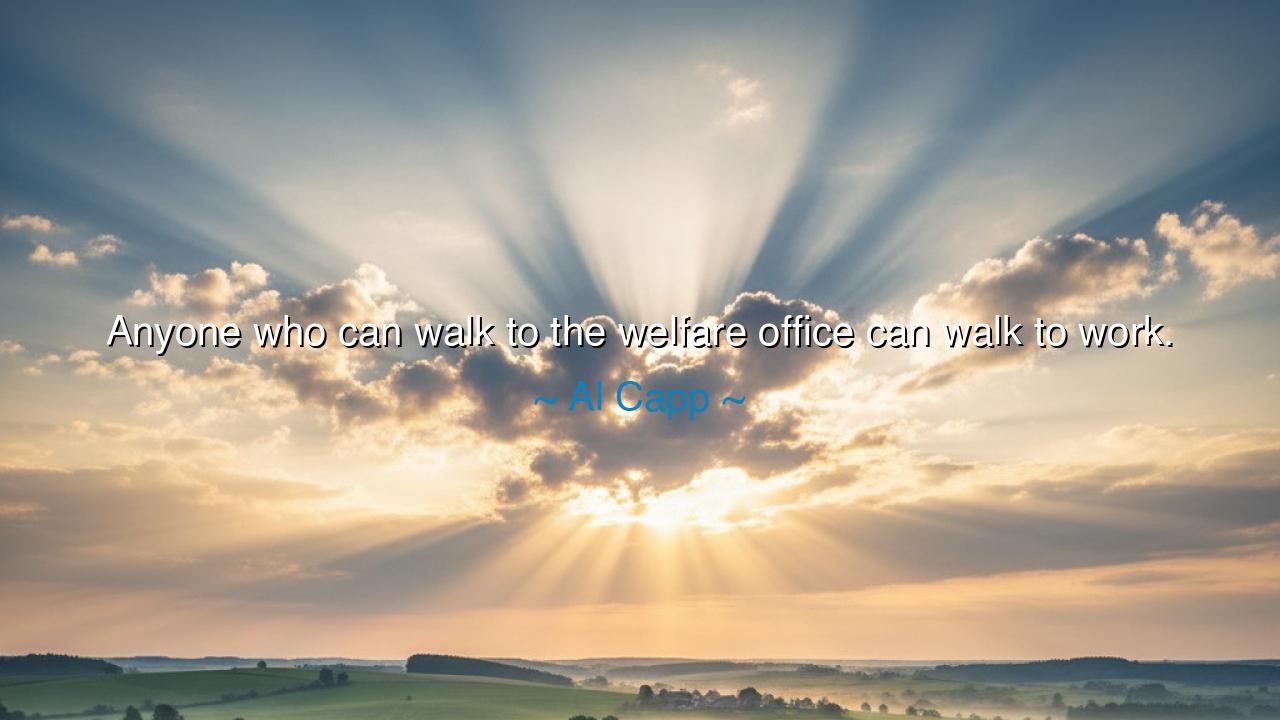
Anyone who can walk to the welfare office can walk to work.






Al Capp, the satirist whose wit often cut as sharp as a sword, once declared: “Anyone who can walk to the welfare office can walk to work.” Beneath the sting of this jest lies a stern creed of self-reliance and labor. For Capp sought to remind his listeners that strength wasted in seeking handouts could instead be turned toward the dignity of work, where independence is born and the spirit is kept alive.
The ancients, too, honored this principle. They told of the farmer who tills the field with sweat, of the craftsman who earns his bread with skill, of the warrior who claims no feast unless he has stood in battle. To live from the toil of others was often seen as dishonor; to labor for oneself was the mark of virtue. Thus, Capp’s sharp words echo an ancient disdain for idleness, and an exhortation to claim dignity through effort.
Yet his quote is more than chastisement; it is a call to awaken hidden strength. To walk is already to possess ability, to hold within the body the capacity for motion, for discipline, for persistence. If one can walk far enough to ask for sustenance, then one already possesses the seed of power to earn it. Capp’s wisdom here is that opportunity often begins not with wealth or privilege, but with willingness—the first step toward labor.
But let us not hear this only as judgment. The saying also carries a challenge to society: to ensure that work exists for those willing to labor. For though Capp speaks sharply of personal duty, the ancients also knew that a just community must provide paths for its people to live by their hands. Thus, this teaching is both to the individual—do not waste your strength—and to the world—do not deny the worker his field.
Let the generations remember: the road to dignity is paved with work, not dependency. To walk is to possess freedom of motion; to labor is to possess freedom of spirit. As Capp teaches, let no one trade the pride of self-reliance for the bondage of idleness, for in every willing step lies the promise of honor, independence, and life made meaningful through effort.






HMTao Thi Hong Mai
Al Capp's quote seems to carry a message about self-sufficiency, but it feels like it ignores the nuances of real-life struggles. It might be easy to make such a statement from the outside looking in, but how many people face significant obstacles in finding stable work? Is it fair to expect someone to 'just walk to work' without addressing deeper issues like mental health, discrimination, or job availability?
TLTrinh Tuan Linh
This quote makes me question the assumptions we often have about people who are struggling financially. While it's easy to say that everyone should just work if they can walk, it's essential to consider the many factors that contribute to someone's situation. How do we ensure that we’re being empathetic and realistic in our understanding of poverty and unemployment, rather than reducing it to a simple matter of effort?
DHPhan Dinh Huy
I find this quote quite harsh. It implies that people who rely on welfare are simply choosing not to work, but there are many complexities behind why people end up needing assistance. Isn’t it more important to consider the barriers people face—like lack of access to education, jobs, or even transportation? How do we address these challenges before making broad assumptions about people's willingness to work?
CTChibi Tien
This quote seems to reflect a very black-and-white view of work and responsibility. While it's true that work requires effort, the quote oversimplifies the struggles some people face in finding employment. What about those who face systemic barriers or lack resources? Can we really say that everyone has equal opportunity to 'walk to work'? I think it’s important to recognize that not everyone has the same starting point or opportunities.